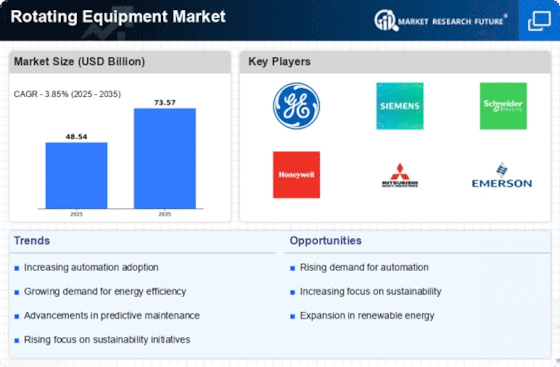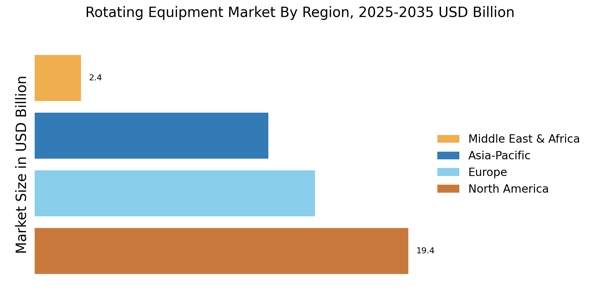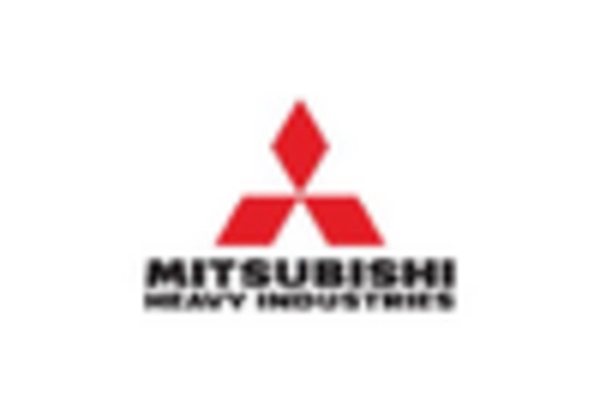Growth in Renewable Energy Sector
The Rotating Equipment Market is benefiting from the rapid growth in the renewable energy sector. As countries strive to transition towards cleaner energy sources, there is a heightened demand for rotating equipment that supports renewable energy generation, such as wind turbines and hydroelectric generators. The renewable energy market is expected to witness a compound annual growth rate of over 8%, which will likely drive the need for advanced rotating equipment designed for these applications. This shift not only aligns with global sustainability goals but also presents opportunities for manufacturers to innovate and develop specialized equipment tailored for renewable energy projects. The increasing focus on renewable energy is thus a key driver for the Rotating Equipment Market, fostering growth and technological advancements.
Expansion of Industrial Automation
The Rotating Equipment Market is significantly influenced by the ongoing expansion of industrial automation. As industries adopt advanced automation technologies, the demand for rotating equipment that integrates seamlessly with automated systems is increasing. This trend is particularly evident in sectors such as manufacturing, oil and gas, and power generation, where automated processes require reliable and efficient rotating machinery. The market for industrial automation is projected to grow at a compound annual growth rate of over 9%, indicating a robust demand for rotating equipment that can support these advancements. Consequently, manufacturers are focusing on developing smart rotating equipment that can communicate with other automated systems, thereby enhancing overall operational efficiency and reliability within the Rotating Equipment Market.
Increasing Demand for Energy Efficiency
The Rotating Equipment Market is experiencing a notable surge in demand for energy-efficient solutions. Industries are increasingly focusing on reducing operational costs and minimizing environmental impact. This trend is driven by regulatory pressures and the need for sustainable practices. According to recent data, energy-efficient rotating equipment can reduce energy consumption by up to 30%, which is a compelling incentive for industries to upgrade their systems. As a result, manufacturers are innovating to produce equipment that not only meets efficiency standards but also enhances performance. This shift towards energy efficiency is likely to propel the growth of the Rotating Equipment Market, as companies seek to align with global sustainability goals while optimizing their operational efficiency.
Technological Innovations in Rotating Equipment
The Rotating Equipment Market is experiencing a wave of technological innovations that are reshaping the landscape of equipment design and functionality. Advancements in materials science, digitalization, and IoT integration are enabling the development of more efficient and reliable rotating equipment. For instance, the incorporation of smart sensors and predictive analytics allows for real-time monitoring and maintenance, reducing downtime and enhancing performance. The market for smart rotating equipment is projected to grow significantly, driven by the need for improved operational efficiency and reduced maintenance costs. As industries increasingly adopt these technologies, the Rotating Equipment Market is likely to witness a transformation, characterized by enhanced capabilities and performance metrics that meet the evolving demands of various sectors.
Rising Investments in Infrastructure Development
The Rotating Equipment Market is poised for growth due to rising investments in infrastructure development across various sectors. Governments and private entities are allocating substantial budgets for the construction and upgrading of infrastructure, including transportation, energy, and water management systems. This influx of investment is expected to drive demand for rotating equipment, such as pumps, compressors, and turbines, which are essential for these projects. For instance, the global infrastructure investment is projected to reach trillions of dollars in the coming years, creating a favorable environment for the Rotating Equipment Market. As infrastructure projects ramp up, the need for reliable and efficient rotating equipment will become increasingly critical, thereby supporting market expansion.

















